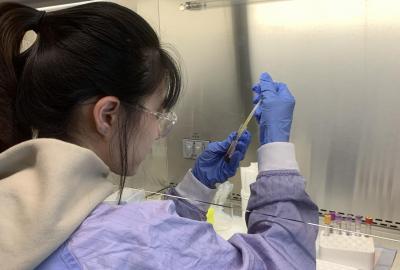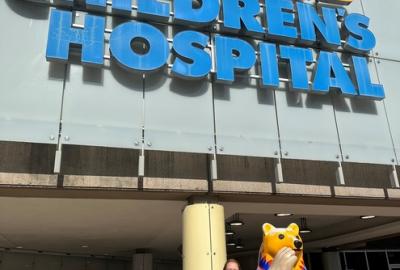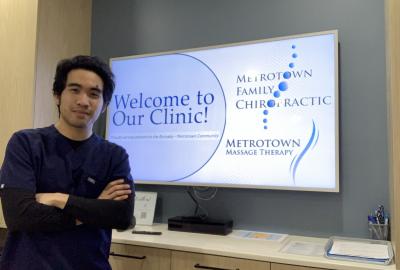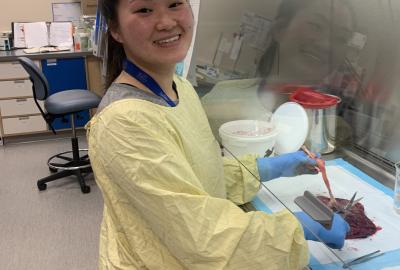
From a young age, I was fascinated with biology and also really wanted to help people. So, when it came time to deciding on a career, I determined that becoming a doctor would perfectly combine these two areas of interest. I completed high school with that goal in mind; taking all of the science courses and volunteering regularly at a local seniors centre. When it came time to applying to university, I was immediately attracted to the Bachelor of Science in Health Sciences at SFU because it seemed like the perfect program to prepare me for a future career as a doctor. Being involved with co-op was never part of my original plan, however, it was one of the best decisions that I made during my undergrad. It totally changed my views on all the possibilities available out there and helped prepare my for a career in the healthcare field.
At first, my view of the healthcare field was narrow and limited because I thought it was solely made up of doctors and nurses and that if you were not either of those two professions, then you couldn’t work in healthcare. This view changed when I attended a career fair in my second semester at SFU. I stopped by the Fraser Health table with the intention of discussing what I could do to get into medical school and prepare for a career as a doctor. The recruiter asked me a question that I had not considered before: “What if you do not get into medical school? What are your backup plans?” This was something that I had foolishly not considered before. After my conversation with the recruiter, I started to seriously think about what my back-up plans would be – my biggest fear at the time was graduating from university and not having a meaningful career after all the effort and hard work. This was right around the time I found out about the Health Sciences Co-op program.
After applying to co-op and completing the preparatory workshops and Bridging Online (BOL), I eagerly started applying for jobs. I submitted several applications and was invited to five interviews, but was unsuccessful in securing a position. This was my first experience with facing rejection and I felt very discouraged and uncertain about the future. In hindsight, it’s not surprising to me now that I didn’t get a placement; the only experience I had was working at McDonald’s for a couple of months and volunteering at a seniors centre. In speaking with my co-op advisor, I decided that I would take some time to volunteer in order to gain more relevant experiences and skills. While I was job searching, I began asking for feedback after every interview I had. Armed with this information, I strategically sought volunteer positions and opportunities that would address the feedback I received from employers. For example, a few of the positions I applied to and got interviews for were for Research Assistant positions in epidemiological studies. The feedback I got was that, although my academics were impressive, I did not have enough experience working in a research setting and that I lacked some of the technical skills essential to the job. To address this, I emailed my professors involved in running research studies and started volunteering as a research assistant for two of them. Over the course of three semesters, I also became a Peer Educator and started volunteering at BC Children’s Hospital, in addition to taking a full course load.
This period was a time of immense growth; not only did I gain a wealth of new experiences and skills, I also learned a great deal about the possibilities available in research and the health care fields. I developed invaluable skills like time-management, working on multiple projects and learning to prioritize responsibilities. When I started applying for co-op jobs again, I submitted applications to four jobs before I got an interview, followed by a job offer.
My first co-op job was as a Hand Hygiene Auditor at the Provincial Health Services Authority (PHSA). This was the perfect job for me because I had the opportunity to work at the Cancer Agency, Children’s and Women’s Hospital, Centre for Disease Control and Forensic Psychiatric Hospital. I also had the opportunity to work with nurses, doctors and people of other professions. My co-op terms with PHSA played an important role in opening me up to many of the opportunities in the health care field that I had not previously known existed. As I explored these opportunities further, I found that my perspective changed and going to medical school was no longer a top priority.
Currently, I am halfway through an eight-month co-op term working in Program Evaluation for BC Mental Health & Substance Use Services. Although I have only been working here for four months, I have learned a lot about how health programs are developed, implemented and evaluated. I have also had the opportunity to work on all of the stages of program development, from creating logic models and doing literature searches for new programs to managing databases of existing programs.
It has been such an eye-opening experience to see other areas of the healthcare system and I feel that I now have a much larger and more complete view. Co-op has inspired me to take courses and senior seminars that have further expanded my understanding of how the healthcare system works. It made my education more meaningful because I now have a context in which to apply what I have learned in the classroom. I am still very passionate about helping people and working in healthcare, but I have found that I am more interested in working within the healthcare system in areas such as quality improvement and program management as opposed to providing direct patient care. Nearing graduation, I have a much more holistic understanding of the healthcare field and my role in it and I feel very optimistic about the career opportunities available moving forward.
Beyond the Blog
- Want an opportunity similar to Ornela's? Check out Health Sciences Co-op page, here.















